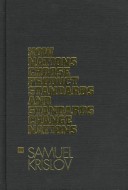Pitt Series in Policy & Institutional Studies
1 total work
But nations use product standards, and manipulate them, for reasons other than rational use. The Soviet Bloc once cultivated standards to isolate themselves. In America, codes and standards are often used to favor home industries over external competition, and to favor some internal producers over others -- otherwise known as "protectionism" and "monopolization". And the European Community must develop continental product standards in order to achieve their goals of economic integration and to build community.
The emphasis that Europe 1992 placed on such standards has dramatically called attention to the role they play in everyday life and the near invisibility of the process of their formation. Samuel Krislov thoroughly explores the origins, evolutions, and influence of product standards -- their systematic choice at the national and international level, and their uses for national definitions and boundaries.
Krislov compares and contrasts the United States, the EC, the former Soviet Eastern Bloc, and Japan, to link standard choice with political styles and to trace growing internationalization based on product efficiency criteria. While standards are of mounting concern to politicians, industries, and consumers, especially since the NAFTA and EC agreements, there has been little or no rigorous study of them. Thorough and engaging, this bookexplains a crucial and poorly understood facet of modern life.
"Krislov provides a fascinating overview of an extremely important but too often neglected subject, namely business standards and the critical role they have played and continue to play in both the national and global economy. What makes his study especially valuable as its rich and detailed comparative and historical scope". David Vogel, University of California, Berkeley
